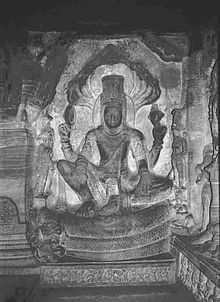Parameshwara (God)
Parameshwara or Parameshwar means the Supreme God. It is transliterated from the Sanskrit word, ईश्वर [1] (pronunciation: īśvára). It refers to the sole deity in monotheism.[2] The word "param" meaning the highest is added to Ishwara to intensify the title of God.
Etymology
The word Parameshwara is a compound word formed by joining three words- parama + Ish +vara. The word parama means ' supreme'. The word Ish(Isha) means the ruler/master/owner. The word Vara means the best/ the noblest/ the excellent. Thus the word Parameshwara literally means 'the excellent supreme ruler/ master'. Similarly the word Maheshwara ( Maha+Ishwara) means ' the great master or the excellent Ruler. Similarly Lord Shiva is also called Mahesha (Maha+ Isha) which also means 'the great Lord/Master'. In Shaivism all these words are synonymous to Lord Shiva.
Conceptualization
Same as Absolute Reality or Absolute Truth (See Para Brahman). The term Parameshwara (Supreme Lord) is used specifically indicate The Supreme Personality of Godhead, who is also the “supreme controller”. And yet it is common that in many Vedic scriptures the term Ishvara is used as a short form for Parameshwara. According to Shaiva puranas and siddhantas, Lord Shiva is Parameshwara. According to Vaishnavite scriptures, Lord Narayana, also known as Vishnu or Hari is Parameshwara. According to Bible translations into Hindi and Urdu, the Supreme Lord who loved the world and gave his only son so that whoever believes in him may have eternal life, as it is written in John 3:16, is Parameshwara. Also note that the term Maheshvara is also used as a synonym to denote Lord Shiva.
See also
- Brahman
- Conceptions of God
- Cosmos
- Existence of God
- God
- Krishna
- Names of God
- Narayana
- Para Brahman
- Rudra
- Shiva
- Supreme Being
- The Absolute
- Vishnu
